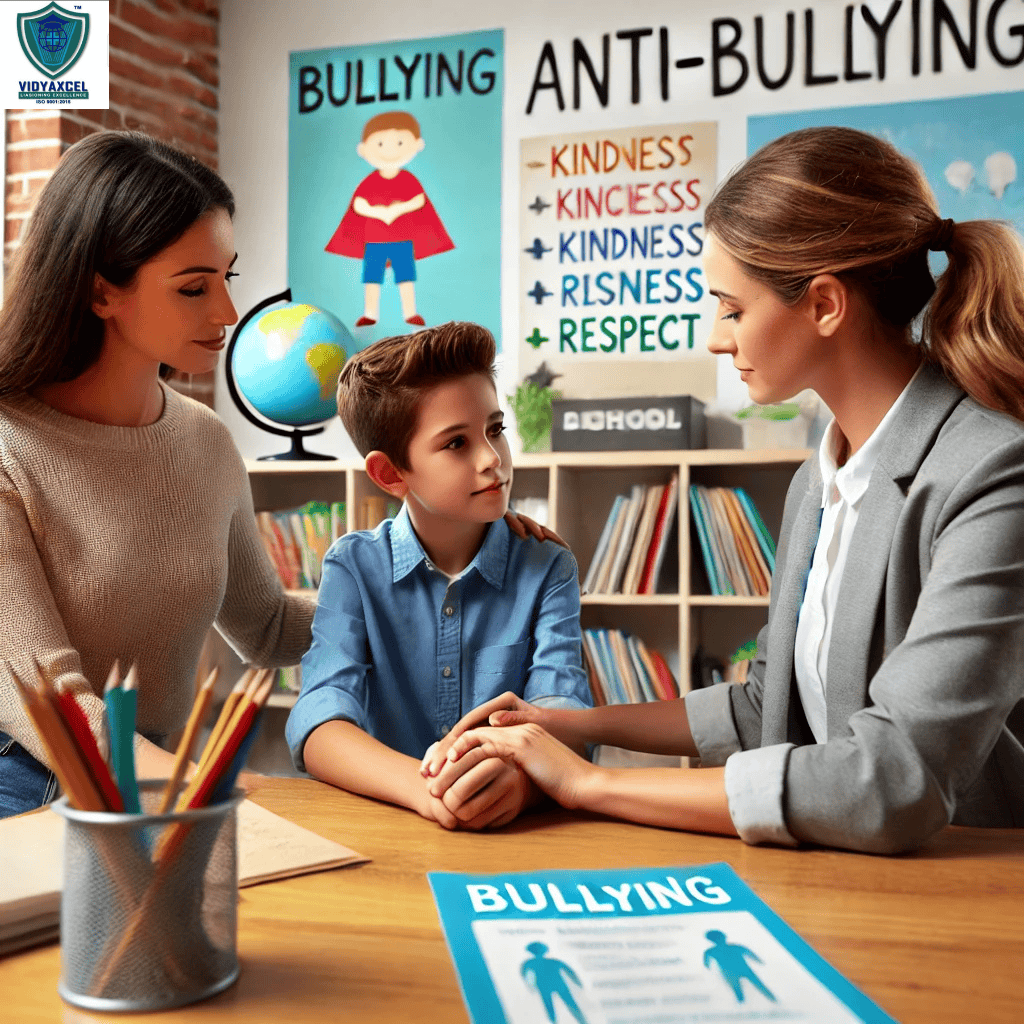Blog Details

08Jan
How to Handle Bullying Advice for Parents and Kids
Bullying is a widespread issue that affects children and adults alike, causing emotional distress and, in some cases, long-term psychological impacts. For parents and kids, knowing how to handle bullying effectively is crucial to creating a safe and supportive environment at home, in school, and online. This guide offers practical advice to help parents empower their children to stand up against bullying, foster resilience, and promote kindness, while also equipping kids with the tools to navigate difficult situations confidently.
For Parents
1. Recognize the Signs of Bullying
Children often don’t report bullying, so look out for:
- Unexplained injuries or damaged belongings.
- Frequent complaints of illness or reluctance to go to school.
- Sudden changes in behavior, like withdrawal or irritability.
- Decline in academic performance or loss of interest in activities they once enjoyed.
2. Create an Open Communication Environment
- Encourage your child to share their feelings without fear of judgment.
- Ask specific questions like, “How was your day?” or “Did anything upset you today?”
- Reassure them that reporting bullying is not tattling and that you’re there to help.
3. Teach Coping Strategies
Help your child understand how to respond when faced with bullying:
- Stay calm: Teach them not to react emotionally, as bullies often seek a reaction.
- Use assertive language: Practice phrases like, “Stop that. It’s not okay.”
- Walk away: Encourage them to leave the situation and find a safe adult if needed.
4. Work with the School
- Report bullying incidents to teachers, counselors, or school administrators.
- Request a meeting to discuss anti-bullying policies and how the school plans to address the issue.
- Follow up regularly to ensure the problem is being handled appropriately.
5. Monitor Online Activity
Cyber bullying is a growing concern.
- Teach your child to block or report abusive messages.
- Set boundaries around screen time and monitor their online interactions.
- Use parental controls to keep track of their social media use.
For Kids
1. Understand What Bullying Is
Bullying includes behaviors like:
- Physical harm (e.g., hitting, pushing).
- Verbal abuse (e.g., name-calling, insults).
- Social exclusion or spreading rumors.
- Cyber bullying (e.g., mean messages online or via texts).
2. Speak Up
If you’re being bullied:
- Tell an adult you trust: Whether it’s a parent, teacher, or school counselor, don’t keep bullying a secret.
- Ask for help: Let someone know when you feel unsafe or uncomfortable.
3. Build Confidence
- Spend time with friends who support and respect you.
- Practice positive self-talk to remind yourself of your strengths and worth.
- Join activities you enjoy to meet new people and boost your confidence.
4. Be an Ally to Others
If you see someone being bullied:
- Stand up for them if it’s safe to do so.
- Report the bullying to a trusted adult.
- Include the person in your group to help them feel supported.
Preventive Measures for Parents and Kids
Parents:
- Foster empathy by teaching kids to understand how their actions affect others.
- Encourage open discussions about bullying and how to handle it.
- Model respectful behavior and conflict resolution at home.
Kids:
- Treat everyone with kindness and respect.
- Avoid joining in bullying behavior, even as a bystander.
- Be a role model for others by promoting inclusivity and fairness.
Conclusion
Bullying can be a challenging experience, but with the right strategies and support, it can be addressed effectively. By maintaining open communication, fostering self-esteem, and teaching empathy, parents and kids can work together to build a culture of respect and kindness. Remember, tackling bullying requires patience, teamwork, and a proactive approach, but it is a journey worth taking for the well-being and growth of every child. Together, we can create a world where everyone feels safe, valued, and respected.
FAQ’s
How can parents prevent bullying?
Foster empathy and respect at home. Teach children the value of kindness, encourage them to stand up for others, and model positive behavior. Regularly communicate with your child about their day-to-day experiences.
What role does the school play in handling bullying?
Schools are responsible for providing a safe environment. They should have policies in place to address bullying. Parents should collaborate with teachers and school counselors to ensure appropriate measures are taken.
Can bullying have long-term effects?
Yes, bullying can lead to anxiety, depression, and low self-esteem. Early intervention and professional support, if needed, can help mitigate these effects.
How can a child build confidence to deal with bullies?
Encourage participation in activities they enjoy, build their social skills, and teach them to focus on their strengths. Role-playing scenarios can also help them practice assertive responses.
Should I confront the bully or their parents?
It’s generally better to involve the school or other authorities rather than directly confronting the bully or their parents. Direct confrontations can escalate the situation.
Our Office: West Bengal, Maharashtra & Delhi.
For More Infomation about admission in Medical, Engineering, Management & Study in Overseas Details.
View Current Study Overseas, Medical, Engineering & Management Admission Details Video.





